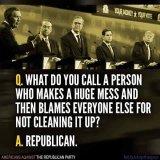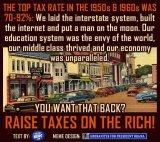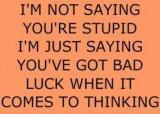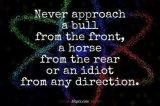again you try to confuse things... it's not about a third term... it's about what he did for the country.... are facts confusing to you?And why did everyone love him?
You are using an out of date browser. It may not display this or other websites correctly.
You should upgrade or use an alternative browser.
You should upgrade or use an alternative browser.
Vote for Mr. Trump why ? Check out please
- Thread starter Raj-the -cuck
- Start date
the meme said 70-90%..... but apparently you only read the part you wanted to argue aboutActually it was 70% - look it up your self, but who cares about facts right
again you try to confuse things... it's not about a third term... it's about what he did for the country.... are facts confusing to you?
No, again you can not comprehend - I AM ASKING YOU WHY YOU THINK PEOPLE LIKED HIM
Let me say it slower,
WHY .... DO .... YOU .... THINK ... PEOPLE... LIKED ... FDR?
Stop twisting things and just answer the fucking question.
No, again you can not comprehend - I AM ASKING YOU WHY YOU THINK PEOPLE LIKED HIM
Let me say it slower,
WHY .... DO .... YOU .... THINK ... PEOPLE... LIKED ... FDR?
let me repeat myself because it must take more than one time for you to understand
Stop twisting things and just answer the fucking question.
again you try to confuse things... it's not about a third term... it's about what he did for the country.... are facts confusing to you?
the meme said 70-90%..... but apparently you only read the part you wanted to argue about
The issue is simple, you are incapable of answering a DIRECT question.
milflover006
Male
90% is the "suicide" rate if you are going to testify against or no have something on the Clintons. Lol
not sure just how many times you want to tell you... the same answer... but it is just not what you want to hear.... doesn't fit in with your right wing logic!The issue is simple, you are incapable of answering a DIRECT question
milflover006
Male
Know not no lol. Damn auto correct
what the hell are you talking about?90% is the "suicide" rate if you are going to testify against or no have something on the Clintons. Lol
if you googled something once in a while you might get a far different version that what your Glen Beck says!
hell you might even get an education
Just because you googled it doesnt make it a fact dumb ass. I can google the earth is flat and some nut job somewhere will have some bullshit saying its flat
No, again you can not comprehend - I AM ASKING YOU WHY YOU THINK PEOPLE LIKED HIM
Let me say it slower,
WHY .... DO .... YOU .... THINK ... PEOPLE... LIKED ... FDR?
Stop twisting things and just answer the fucking question.
He wont answer it because he knows the real answer. People liked FDR because they were down and out during the depression and FDR smooth talked them and told them he would help them out by giving them stuff and all the while he is expanding the government and its authority and they were to blinded to realize they were slowly losing their freedoms to an every increasing government
He wont answer it because he knows the real answer. People liked FDR because they were down and out during the depression and FDR smooth talked them and told them he would help them out by giving them stuff and all the while he is expanding the government and its authority and they were to blinded to realize they were slowly losing their freedoms to an every increasing government
Thats when the new deal came out and all the poor folk and black folks really started voting democrat
well dipshit... if you try it sometime you will see several different articles from several different sources... you should try it might improve your intelligence... although a door knob is not known for having anyJust because you googled it doesnt make it a fact dumb ass. I can google the earth is flat and some nut job somewhere will have some bullshit saying its flat
Fireside chats is the term used to describe a series of 30 evening radio conversations (chats) given by U.S. President Franklin D. Roosevelt between 1933 and 1944. Roosevelt spoke with familiarity to millions of Americans about the promulgation of the Emergency Banking Act in response to the banking crisis, the recession, New Deal initiatives, and the course of World War II. On radio, he was able to quell rumors and explain his policies. His tone and demeanor communicated self-assurance during times of despair and uncertainty. Roosevelt was one of radio's greatest communicators,[peacock term] and the fireside chats kept him in high public regard throughout his presidency.
The series of fireside chats was among the first 50 recordings made part of the National Recording Registry of the Library of Congress, which noted it as "an influential series of radio broadcasts in which Roosevelt utilized the media to present his programs and ideas directly to the public and thereby redefined the relationship between the President and the American people."
Roosevelt understood that his administration's success depended upon a favorable dialogue with the electorate — possible only through methods of mass communication — and that the true power of the presidency was the ability to take the initiative. The use of radio for direct appeals was perhaps the most important of FDR's innovations in political communication.[1]:153 Roosevelt's opponents had control of most newspapers in the 1930s and press reports were under their control and involved their editorial commentary. Historian Betty Houchin Winfield says, "He and his advisers worried that newspapers' biases would affect the news columns and rightly so."[2] Historian Douglas B. Craig says that he "offered voters a chance to receive information unadulterated by newspaper proprietors' bias" through the new medium of radio.[3]
Roosevelt first used what would become known as fireside chats in 1929 as Governor of New York.[4] He faced a conservative Republican legislature, so during each legislative session he would occasionally address the residents of New York directly.[5] His third gubernatorial address—April 3, 1929, on WGY radio—is cited by Roosevelt biographer Frank Freidel as being the first fireside chat.[5]
In these speeches, Roosevelt appealed to radio listeners for help getting his agenda passed.[4] Letters would pour in following each of these addresses, which helped pressure legislators to pass measures Roosevelt had proposed.[6]
Fireside Chat 1 On the Banking Crisis
Roosevelt's first Fireside Chat on the Banking Crisis (March 12, 1933)
As President, Roosevelt began making the informal addresses on March 12, 1933, eight days after his inauguration. He had spent his first week coping with a month-long epidemic of bank closings that was ruining families nationwide.[7]:78 He closed the entire American banking system on March 6. On March 9 Congress passed the Emergency Banking Act, which Roosevelt used to effectively create federal deposit insurance when the banks reopened.[8] At 10 p.m. ET that Sunday night, on the eve of the end of the bank holiday, Roosevelt spoke to a radio audience of more than 60 million people, to tell them in clear language "what has been done in the last few days, why it was done, and what the next steps are going to be".[7]:78–79
The result, according to economic historian William L. Silber, was a "remarkable turnaround in the public's confidence ... The contemporary press confirms that the public recognized the implicit guarantee and, as a result, believed that the reopened banks would be safe, as the President explained in his first Fireside Chat." Within two weeks people returned more than half of the cash they had been hoarding, and the first stock-trading day after the bank holiday marked the largest-ever one-day percentage price increase.[8]
The term "fireside chat" was inspired by a statement by Roosevelt's press secretary, Stephen Early, who said that the president liked to think of the audience as a few people seated around his fireside. Listeners were able to picture FDR in his study, in front of the fireplace, and could imagine they were sitting beside him.[9]:57–58 The term was coined by CBS broadcast executive Harry C. Butcher of the network's Washington, D.C., office,[10] in a press release before the address of May 7, 1933.[11] The phrase has often been credited to CBS journalist Robert Trout, but he said he was simply the first person to use the it on the air.[12] The title was picked up by the press and public and later used by Roosevelt himself,[11] becoming part of American folklore.[10]
Roosevelt customarily made his address from the Diplomatic Reception Room of the White House. He would arrive 15 minutes before air time to welcome members of the press, including radio and newsreel correspondents. NBC White House announcer Carleton E. Smith gave him a simple introduction: "Ladies and gentlemen, the president of the United States." Roosevelt most often began his talks with the words, "My friends" or "My fellow Americans", and he read his speech from a looseleaf binder.[10] Presidential advisor and speechwriter Samuel Rosenman recalled his use of common analogies and his care in avoiding dramatic oratory: "He looked for words that he would use in an informal conversation with one or two of his friends".[9]:58 Eighty percent of the words used were in the thousand most commonly used words in the English language.[6]
The radio historian John Dunning wrote that "It was the first time in history that a large segment of the population could listen directly to a chief executive, and the chats are often credited with helping keep Roosevelt's popularity high."[10]
Each radio address went through about a dozen drafts. Careful attention was also given to Roosevelt's delivery. When he realized that a slight whistle was audible on the air due to a separation between his two front lower teeth, FDR had a removable bridge made.[9]:58
FDR is regarded[by whom?] as one of the most effective communicators in radio history.[10] Although the fireside chats are sometimes thought of as weekly events, Roosevelt delivered just 30 addresses[6] during a presidency lasting 4,422 days.[14] He resisted those who encouraged him to speak on radio more frequently, as shown in his response to Russell Leffingwell after the address of February 23, 1942:
Franklin D. Roosevelt was in his second term as governor of New York when he was elected as the nation’s 32nd president in 1932. With the country mired in the depths of the Great Depression, Roosevelt immediately acted to restore public confidence, proclaiming a bank holiday and speaking directly to the public in a series of radio broadcasts or “fireside chats.” His ambitious slate of New Deal programs and reforms redefined the role of the federal government in the lives of Americans. Reelected by comfortable margins in 1936, 1940 and 1944, FDR led the United States from isolationism to victory over Nazi Germany and its allies in World War II. He spearheaded the successful wartime alliance between Britain, the Soviet Union and the United States and helped lay the groundwork for the post-war peace organization that would become the United Nations. The only American president in history to be elected four times, Roosevelt died in office in April 1945.
he brought the country out of a depression... his fireside chats let people know exactly what was going... he put in measures to try and stop anymore failures in the financial world.... he was/is a popular pres.... no matter your opinion.... but you people on the right always have a twisted view
The series of fireside chats was among the first 50 recordings made part of the National Recording Registry of the Library of Congress, which noted it as "an influential series of radio broadcasts in which Roosevelt utilized the media to present his programs and ideas directly to the public and thereby redefined the relationship between the President and the American people."
Roosevelt understood that his administration's success depended upon a favorable dialogue with the electorate — possible only through methods of mass communication — and that the true power of the presidency was the ability to take the initiative. The use of radio for direct appeals was perhaps the most important of FDR's innovations in political communication.[1]:153 Roosevelt's opponents had control of most newspapers in the 1930s and press reports were under their control and involved their editorial commentary. Historian Betty Houchin Winfield says, "He and his advisers worried that newspapers' biases would affect the news columns and rightly so."[2] Historian Douglas B. Craig says that he "offered voters a chance to receive information unadulterated by newspaper proprietors' bias" through the new medium of radio.[3]
Roosevelt first used what would become known as fireside chats in 1929 as Governor of New York.[4] He faced a conservative Republican legislature, so during each legislative session he would occasionally address the residents of New York directly.[5] His third gubernatorial address—April 3, 1929, on WGY radio—is cited by Roosevelt biographer Frank Freidel as being the first fireside chat.[5]
In these speeches, Roosevelt appealed to radio listeners for help getting his agenda passed.[4] Letters would pour in following each of these addresses, which helped pressure legislators to pass measures Roosevelt had proposed.[6]
Fireside Chat 1 On the Banking Crisis
Roosevelt's first Fireside Chat on the Banking Crisis (March 12, 1933)
As President, Roosevelt began making the informal addresses on March 12, 1933, eight days after his inauguration. He had spent his first week coping with a month-long epidemic of bank closings that was ruining families nationwide.[7]:78 He closed the entire American banking system on March 6. On March 9 Congress passed the Emergency Banking Act, which Roosevelt used to effectively create federal deposit insurance when the banks reopened.[8] At 10 p.m. ET that Sunday night, on the eve of the end of the bank holiday, Roosevelt spoke to a radio audience of more than 60 million people, to tell them in clear language "what has been done in the last few days, why it was done, and what the next steps are going to be".[7]:78–79
The result, according to economic historian William L. Silber, was a "remarkable turnaround in the public's confidence ... The contemporary press confirms that the public recognized the implicit guarantee and, as a result, believed that the reopened banks would be safe, as the President explained in his first Fireside Chat." Within two weeks people returned more than half of the cash they had been hoarding, and the first stock-trading day after the bank holiday marked the largest-ever one-day percentage price increase.[8]
The term "fireside chat" was inspired by a statement by Roosevelt's press secretary, Stephen Early, who said that the president liked to think of the audience as a few people seated around his fireside. Listeners were able to picture FDR in his study, in front of the fireplace, and could imagine they were sitting beside him.[9]:57–58 The term was coined by CBS broadcast executive Harry C. Butcher of the network's Washington, D.C., office,[10] in a press release before the address of May 7, 1933.[11] The phrase has often been credited to CBS journalist Robert Trout, but he said he was simply the first person to use the it on the air.[12] The title was picked up by the press and public and later used by Roosevelt himself,[11] becoming part of American folklore.[10]
Roosevelt customarily made his address from the Diplomatic Reception Room of the White House. He would arrive 15 minutes before air time to welcome members of the press, including radio and newsreel correspondents. NBC White House announcer Carleton E. Smith gave him a simple introduction: "Ladies and gentlemen, the president of the United States." Roosevelt most often began his talks with the words, "My friends" or "My fellow Americans", and he read his speech from a looseleaf binder.[10] Presidential advisor and speechwriter Samuel Rosenman recalled his use of common analogies and his care in avoiding dramatic oratory: "He looked for words that he would use in an informal conversation with one or two of his friends".[9]:58 Eighty percent of the words used were in the thousand most commonly used words in the English language.[6]
The radio historian John Dunning wrote that "It was the first time in history that a large segment of the population could listen directly to a chief executive, and the chats are often credited with helping keep Roosevelt's popularity high."[10]
Each radio address went through about a dozen drafts. Careful attention was also given to Roosevelt's delivery. When he realized that a slight whistle was audible on the air due to a separation between his two front lower teeth, FDR had a removable bridge made.[9]:58
FDR is regarded[by whom?] as one of the most effective communicators in radio history.[10] Although the fireside chats are sometimes thought of as weekly events, Roosevelt delivered just 30 addresses[6] during a presidency lasting 4,422 days.[14] He resisted those who encouraged him to speak on radio more frequently, as shown in his response to Russell Leffingwell after the address of February 23, 1942:
Franklin D. Roosevelt was in his second term as governor of New York when he was elected as the nation’s 32nd president in 1932. With the country mired in the depths of the Great Depression, Roosevelt immediately acted to restore public confidence, proclaiming a bank holiday and speaking directly to the public in a series of radio broadcasts or “fireside chats.” His ambitious slate of New Deal programs and reforms redefined the role of the federal government in the lives of Americans. Reelected by comfortable margins in 1936, 1940 and 1944, FDR led the United States from isolationism to victory over Nazi Germany and its allies in World War II. He spearheaded the successful wartime alliance between Britain, the Soviet Union and the United States and helped lay the groundwork for the post-war peace organization that would become the United Nations. The only American president in history to be elected four times, Roosevelt died in office in April 1945.
he brought the country out of a depression... his fireside chats let people know exactly what was going... he put in measures to try and stop anymore failures in the financial world.... he was/is a popular pres.... no matter your opinion.... but you people on the right always have a twisted view
that's kind of like your NAFTA.... all you like to put it on Clinton... and yet
Following diplomatic negotiations dating back to 1990 among the three nations, U.S. President George H. W. Bush, Canadian Prime Minister Brian Mulroney and Mexican President Carlos Salinas, each responsible for spearheading and promoting the agreement, ceremonially signed the agreement in their respective capitals on December 17, 1992.[5] The signed agreement then needed to be ratified by each nation's legislative or parliamentary branch.
The Canada–United States Free Trade Agreement had been very controversial and divisive in Canada, and the 1988 Canadian election was fought almost exclusively on that issue. In that election, more Canadians voted for anti-free trade parties (the Liberals and the New Democrats) but the split caused more seats in parliament to be won by the pro-free trade Progressive Conservatives (PCs). Mulroney and the PCs had a parliamentary majority and were easily able to pass the 1987 Canada-U.S. FTA and NAFTA bills. However, he was replaced as Conservative leader and prime minister by Kim Campbell. Campbell led the PC party into the 1993 election where they were decimated by the Liberal Party under Jean Chrétien, who had campaigned on a promise to renegotiate or abrogate NAFTA; however, Chrétien subsequently negotiated two supplemental agreements with the new U.S. president. In the U.S., Bush, who had worked to "fast track" the signing prior to the end of his term, ran out of time and had to pass the required ratification and signing of the implementation law to incoming president Bill Clinton. Prior to sending it to the United States Senate Clinton added two side agreements, The North American Agreement on Labor Cooperation (NAALC) and the North American Agreement on Environmental Cooperation (NAAEC), to protect workers and the environment, plus allay the concerns of many House members. It also required U.S. partners to adhere to environmental practices and regulations similar to its own.[citation needed]
After much consideration and emotional discussion, the House of Representatives passed the North American Free Trade Agreement Implementation Act on November 17, 1993, 234-200. The agreement's supporters included 132 Republicans and 102 Democrats. The bill passed the Senate on November 20, 1993, 61-38.[6] Senate supporters were 34 Republicans and 27 Democrats. Clinton signed it into law on December 8, 1993; the agreement went into effect on January 1, 1994.[7][8] Clinton, while signing the NAFTA bill, stated that "NAFTA means jobs. American jobs, and good-paying American jobs. If I didn't believe that, I wouldn't support this agreement."[9]

Following diplomatic negotiations dating back to 1990 among the three nations, U.S. President George H. W. Bush, Canadian Prime Minister Brian Mulroney and Mexican President Carlos Salinas, each responsible for spearheading and promoting the agreement, ceremonially signed the agreement in their respective capitals on December 17, 1992.[5] The signed agreement then needed to be ratified by each nation's legislative or parliamentary branch.
The Canada–United States Free Trade Agreement had been very controversial and divisive in Canada, and the 1988 Canadian election was fought almost exclusively on that issue. In that election, more Canadians voted for anti-free trade parties (the Liberals and the New Democrats) but the split caused more seats in parliament to be won by the pro-free trade Progressive Conservatives (PCs). Mulroney and the PCs had a parliamentary majority and were easily able to pass the 1987 Canada-U.S. FTA and NAFTA bills. However, he was replaced as Conservative leader and prime minister by Kim Campbell. Campbell led the PC party into the 1993 election where they were decimated by the Liberal Party under Jean Chrétien, who had campaigned on a promise to renegotiate or abrogate NAFTA; however, Chrétien subsequently negotiated two supplemental agreements with the new U.S. president. In the U.S., Bush, who had worked to "fast track" the signing prior to the end of his term, ran out of time and had to pass the required ratification and signing of the implementation law to incoming president Bill Clinton. Prior to sending it to the United States Senate Clinton added two side agreements, The North American Agreement on Labor Cooperation (NAALC) and the North American Agreement on Environmental Cooperation (NAAEC), to protect workers and the environment, plus allay the concerns of many House members. It also required U.S. partners to adhere to environmental practices and regulations similar to its own.[citation needed]
After much consideration and emotional discussion, the House of Representatives passed the North American Free Trade Agreement Implementation Act on November 17, 1993, 234-200. The agreement's supporters included 132 Republicans and 102 Democrats. The bill passed the Senate on November 20, 1993, 61-38.[6] Senate supporters were 34 Republicans and 27 Democrats. Clinton signed it into law on December 8, 1993; the agreement went into effect on January 1, 1994.[7][8] Clinton, while signing the NAFTA bill, stated that "NAFTA means jobs. American jobs, and good-paying American jobs. If I didn't believe that, I wouldn't support this agreement."[9]

well dipshit... if you try it sometime you will see several different articles from several different sources... you should try it might improve your intelligence... although a door knob is not known for having any
You think i never googled anything? I just choose not to believe everything that is posted on the web. I wouldnt go around calling people door knobs when you actually believe socialism is good....
Similar threads
- Replies
- 12
- Views
- 2K
- Replies
- 1
- Views
- 1K
- Replies
- 27
- Views
- 4K
- Replies
- 10
- Views
- 2K





